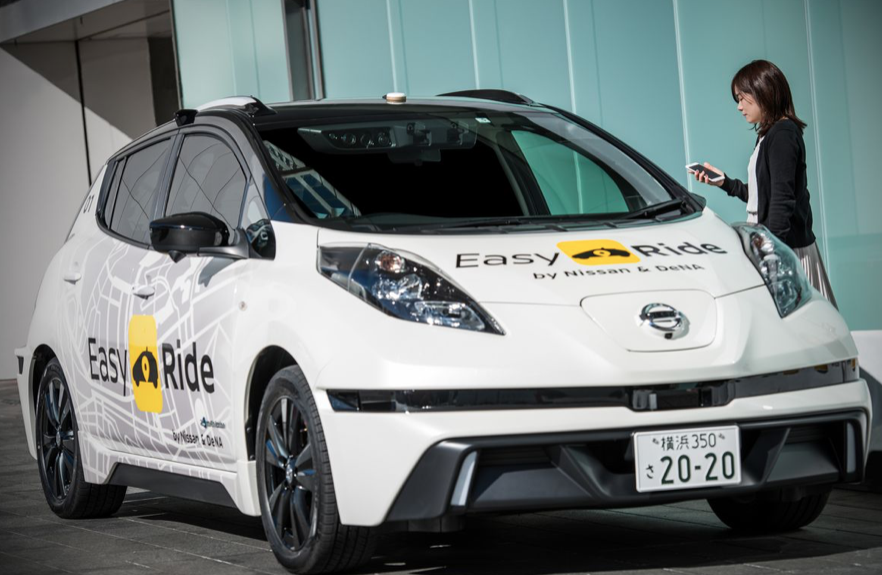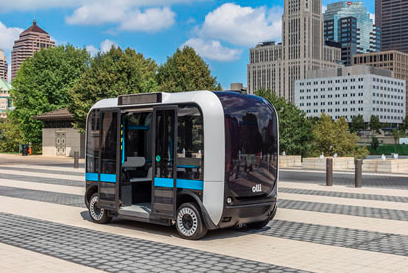Nissan and DeNA testing robotaxis: Nissan Motor Co. is preparing to launch electric robotaxis in the early 2020s — but as for now, more real-world testing needs to be done. Last month in Yokohama, Japan, about 300 people participated in test rides in the Easy Ride robotaxis, which are built on  modified Nissan Leafs. Easy Ride taps into Seamless Autonomous Mobility, which was developed by Nissan from NASA technology, for the automaker’s fleet operation system. Unexpected occurrences are being tested, such as road construction or an event filled with cars and pedestrians blocking traffic. The robotaxi will have support from in-vehicle artificial intelligence and staff working at a control center monitoring the rides. Nissan is counting on its collaboration with DeNA, a Japanese mobile gaming and communications giant. Easy Ride comes with a DeNA-designed smartphone app, where users can hail a taxi by choosing a time slot and where they want to be picked up from a list of preset destinations. Riders view a tablet computer installed inside the car about recommended events in the area; and users are also sent discount coupons for restaurants participating in an Easy Ride affiliate program.
modified Nissan Leafs. Easy Ride taps into Seamless Autonomous Mobility, which was developed by Nissan from NASA technology, for the automaker’s fleet operation system. Unexpected occurrences are being tested, such as road construction or an event filled with cars and pedestrians blocking traffic. The robotaxi will have support from in-vehicle artificial intelligence and staff working at a control center monitoring the rides. Nissan is counting on its collaboration with DeNA, a Japanese mobile gaming and communications giant. Easy Ride comes with a DeNA-designed smartphone app, where users can hail a taxi by choosing a time slot and where they want to be picked up from a list of preset destinations. Riders view a tablet computer installed inside the car about recommended events in the area; and users are also sent discount coupons for restaurants participating in an Easy Ride affiliate program.
Model Y starting next year as debt grows: Tesla Inc. won’t be slowing down anytime soon, with debt mounting to increase Model 3 volume and start up production of its Model Y sport utility electric vehicle. Two sources told Reuters last week that the Model Y compact crossover companion to the Model 3 sedan will start up in November 2019. The sources said that CEO Elon Musk is accepting preliminary bids for supplier contracts on the Model Y. The sources said that suppliers are estimating annual production of 500,000 Model Y vehicles in the U.S. at the Fremont, Calif., plant, with a second factory in China producing a much smaller volume, likely in the tens of thousands. The company had estimated reaching 500,000 vehicles produced this year as the Model 3 is ramped up; Tesla is not reaching that level yet and is unlikely to hit the target. Musk is likely to seek more capital to add the Model Y to its product lineup. Tesla is now burning cash at a rate of more than $2 billion a year. During an interview with CBS’s Gayle King, Musk conceded that the electric carmaker’s robots involved in its Fremont factory process probably slowed down production. Another challenge has been a “crazy, complex network of conveyor belts, and it was not working so [Tesla] got rid of the whole thing,” he said.
Volvo rolling out electric truck: Volvo’s new FL Electric is being rolled out as a delivery truck targeted to cities banning fossil-fuel powered vehicles. The all-electric 16-ton truck will have between two and six lithium-ion batteries with 100-300 kWh, capable of taking the truck up to 186 miles through six batteries. The truck maker says charging time will be one to two hours with DC fast charging, or up to 10 hours on AC with the 300-kWh battery capacity. Volvo Trucks is bringing its experience over to the FL Electric from producing more than 4,000 electrified buses since 2010. “With attractive incentives, agreed standards and a long-term strategy for urban planning and expansion of the charging infrastructure, the process can go much faster,” said Jonas Odermalm, head of product strategy, Volvo FL and Volvo FE at Volvo Trucks.
Protean and LM working on self-driving electrified shuttles: Protean Electric is bringing its in-wheel electric drive system over to autonomous vehicles through a new strategic partnership with U.S. vehicle manufacturer LM Industries. LM is known for building Olli, a self-driving electric shuttle bus. The  partnership will start with providing the eDrive system for Olli. Beyond that, the companies will work on new technologies to accelerate future autonomous and transportation-as-a-service (TaaS) vehicle production.
partnership will start with providing the eDrive system for Olli. Beyond that, the companies will work on new technologies to accelerate future autonomous and transportation-as-a-service (TaaS) vehicle production.
LM Industries focuses on open-source vehicle design. “Open platforms are a critical piece of LM Industries’ strategic vision, allowing us the flexibility to work with innovative companies like Protean Electric and quickly integrate new technologies that let us make great product,” said John Rogers Jr., CEO and co-founder of LM Industries. “Protean Electric’s eDrive technology with in-wheel motors and integrated power electronics, make power-train components obsolete and vehicle digitization easier. It will help us revolutionize self-driving vehicle design creating more space for passengers.”
Protean Electric has been building alliances with other partners including last year with
Consolidated Metco to develop an electric in-wheel drive system to provide hybrid-electric solutions for the medium and heavy-duty commercial vehicle markets. In 2016, a funding round with Chinese investors was carried out, including GO Scale Capital, Zhejiang VIE Science & Technology Co. Ltd., and Tianjin THSG Corporation. The funding has been used to ramp up production in China of Protean’s PD18 product line, and for new product development and formation of a manufacturing joint venture with Zhejiang VIE.




Of all of the awesome pictures you take, the one with Olli and the little girl is one of my favorites. I was at the game and saw this little girl walking up to get her jersey and you could see Olli was happy to give it to her. You captured her little feet jumping off the ground to catch Olli’s high 5.